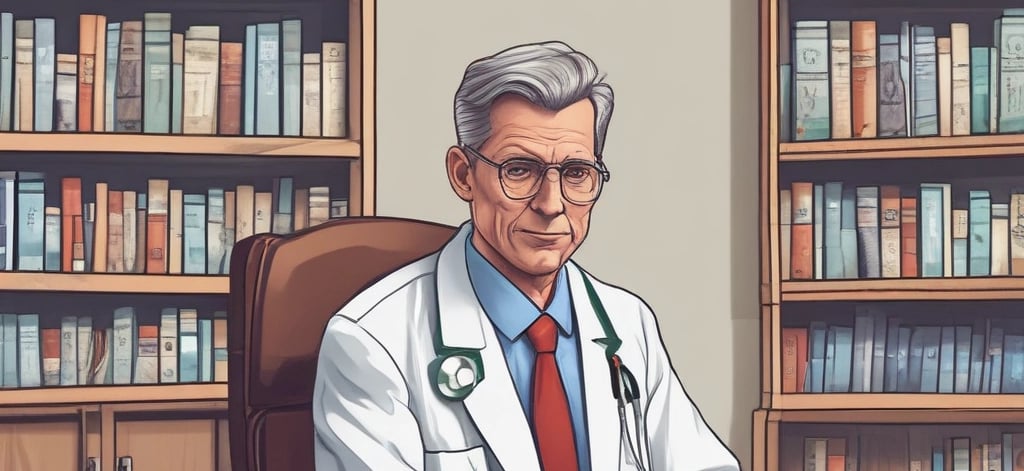How to Prevent Medico-legal Issues as a Clinicians
Medico-legal issues in clinical practice often arise from workplace interactions, patient misunderstandings, poor documentation, and misjudged decisions. Protecting yourself involves maintaining professional boundaries, using a chaperone for sensitive exams, documenting everything accurately, and asking for help when unsure—because the most dangerous clinician is the one who thinks they know it all. Staying cautious, professional, and informed can prevent legal trouble and safeguard your career.
Adebola Badiru
5/8/20245 min read


Making Better Decisions in the Workplace and Avoiding Medico-Legal Issues
One of the biggest risks in clinical practice isn’t just making mistakes—it’s how those mistakes are handled. Every clinician, at some point in their career, will face situations that could have legal or professional consequences. Whether it’s an issue with a colleague, a misunderstanding with a patient, or a documentation error, the way we navigate these challenges can determine whether we walk away unscathed or find ourselves in serious trouble.
I’m no legal expert, but over time, I’ve learned a few things that have helped me avoid unnecessary complications. Some lessons come from personal experience, others from observing colleagues who’ve had difficult encounters. These are the things I keep in mind to protect myself, my career, and ultimately, my patients.
Workplace Interactions: Keeping Professional Boundaries
It’s easy to forget that the people we work with aren’t necessarily our friends. We spend long hours together, share stories, laugh at inside jokes, and develop camaraderie over time. But at the end of the day, the workplace is a professional environment, and the way we interact matters.
One of the most common ways people land in trouble is by crossing professional boundaries. A harmless joke or an offhand comment could be taken the wrong way. A casual compliment might make someone uncomfortable. And in heated moments, raising your voice at a colleague or reacting impulsively can be interpreted as workplace bullying or harassment.
I always remind myself that losing my temper isn’t worth the risk. I’ve made it a personal rule to never react immediately when I’m angry or frustrated. Instead, I give myself five minutes to cool off before saying anything. More often than not, that pause is enough for me to reconsider my words, and by the time I speak, I’m calmer and more rational. If I still feel the same way after five minutes, I address the situation—but I do it with a clear head.
Another mistake I’ve seen clinicians make is assuming that their authority allows them to be forceful with junior colleagues. It doesn’t. Whether you’re a senior clinician or someone in a leadership role, the way you correct others matters. Raising your voice or embarrassing a colleague in front of others can come back to bite you. If there’s an issue, it’s always better to address it privately and professionally rather than reacting emotionally in the moment.
Patient Interactions: The Biggest Legal Risks
While workplace issues can cause problems, most medico-legal troubles don’t come from colleagues—they come from patients.
It’s a hard truth, but some patients will misinterpret your words, exaggerate issues, or even fabricate complaints. That’s not to say all patients are difficult, but in healthcare, we deal with people in distress, and emotions can sometimes cloud judgment.
One of the biggest risks clinicians face is poor documentation. The saying, "If it’s not documented, it didn’t happen," is something I take very seriously. I’ve seen colleagues face disciplinary action simply because their documentation was vague or incomplete. Even worse, some have documented things they never actually did, assuming no one would notice.
A case that stands out is a colleague who documented that he had performed certain special tests on a patient. Unfortunately for him, that patient was medically knowledgeable and knew the tests had never been done. When the patient requested access to their records and saw the false documentation, they filed a formal complaint. That one mistake led to serious consequences.
Since then, I’ve made it a rule: if I didn’t do it, I don’t document it. If I did it, I write it down clearly and concisely. And if something significant happens during a consultation, I ensure my notes are detailed enough to reflect what was discussed.
Beyond documentation, another area where clinicians often slip up is communication. It’s easy to forget that a simple comment, made in passing, can be misinterpreted and lead to complaints. Some patients are highly sensitive to how things are phrased, and a sentence that seems harmless to one person might offend another. I’ve learned that being mindful of my tone and choice of words can prevent a lot of unnecessary trouble.
The Importance of Having a Chaperone
One of the biggest yet often overlooked risks in clinical practice is examining a patient without a chaperone present—especially when assessing sensitive areas.
It doesn’t matter if you’re the most professional clinician in the world—all it takes is one misunderstanding for your career to be on the line.
I’ve seen cases where clinicians were falsely accused of inappropriate behavior, simply because they were alone with a patient during an intimate examination. These situations can escalate quickly, leading to formal complaints, investigations, and, in some cases, legal action.
Having a chaperone present is a simple but crucial safeguard. It protects not only the patient but also the clinician. If a patient later claims that something inappropriate happened, having a witness can mean the difference between being cleared or facing serious consequences.
For me, this is non-negotiable. If an examination involves intimate areas—such as the chest, groin, or inner thighs—I always ensure a chaperone is present, regardless of whether the patient is male or female. And if a patient declines a chaperone, I document that clearly in my notes.
It’s a simple step, but one that can save your career.
If Unsure, Ask—The Most Dangerous Clinician is the One Who Thinks They Know It All
There’s another critical mistake that leads to poor decisions—not asking for help when unsure.
I always say, the most dangerous clinician is the one who thinks they know it all. That’s the easiest way to get a diagnosis wrong, miss something crucial, or end up in a disaster.
Whenever I find myself in a tricky situation with a patient—whether it’s an unusual presentation, a treatment dilemma, or a red flag that I can’t quite put my finger on—I load the boat. I call other clinicians, ask for a second opinion, and get a fresh perspective.
There’s no shame in asking for help. In fact, it’s a mark of a smart clinician. It’s better to pause and consult than to move forward with uncertainty and risk making a costly mistake.
The Danger of Signing Documents Without Understanding Them
One of the biggest mistakes a clinician can make is signing something they don’t fully understand.
If a document says I made a mistake that I know I didn’t make, I won’t sign it. If I’m unsure about something, I take the time to read it properly—or even seek legal advice before putting my signature on anything. I’ve seen people sign disciplinary documents just to “get it over with,” only to realize later that they had unknowingly accepted full responsibility for an issue they weren’t even involved in.
It’s a simple rule: if I don’t fully understand what I’m signing, I don’t sign it.
As a Final Thoughts,
Every clinician, at some point, will face a situation that tests their judgment. Maybe it’s an argument with a colleague, a difficult patient, or an unexpected legal issue. The key to staying out of trouble isn’t just about being a good clinician—it’s about being smart in how you handle workplace interactions, documentation, and legal matters.
For me, that means:
Keeping workplace relationships professional and avoiding unnecessary conflicts.
Documenting everything clearly—but never falsifying records.
Watching my words carefully to avoid misunderstandings with patients.
Ensuring a chaperone is present when performing sensitive examinations.
Asking for help when unsure—never assuming I know it all.
Never signing any document unless I fully understand its implications.
Medico-legal issues are an unfortunate reality in healthcare. But with a little foresight, caution, and self-discipline, we can all protect ourselves and our careers.
📘 If you are applying for NHS roles and struggling with your supporting information, I have written a simple, practical e-book to guide you. It breaks down exactly how to write a strong application using the STAR method, align with the person specification, and tell your story clearly.
Grab your copy here: https://selar.com/236m77
Explore my journey as a physiotherapist leader.
© 2025. All rights reserved.
